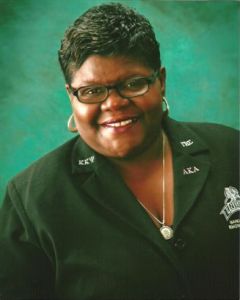Rhonda L. Harper, who took over the Clark Atlanta Mighty Marching Panthers as interim director in August, does not plan on going anywhere. Football season is over, but they are preparing for basketball season.
She’s the second black woman to lead the school’s band, but in 2005, she became the first black woman to hold the position of band director at any historically black college or university (HBCU).
She earned that distinction when she became the head band director at her alma mater, Lincoln University in Pennsylvania, according to Halftime Magazine. Most HBCU band directors, then and now, are men. However, this milestone went largely unnoticed.
“Even to today, I don’t think I’ve ever celebrated it. People said it, people know who I am. Some schools don’t recognize it. I don’t know if anybody cares about it,” said Harper, who started her career in St. Louis in 1982, where she taught band in three school districts at the middle and high school levels.
Harper recognizes she blazed the trail for female band directors. A small number of women have taken top positions at HBCUs over the past few years, including Harper’s predecessor at Clark, Tomisha Brock. Currently, there is only one other black female band director at an HBCU, Juliet Boykins. She leads the band at Elizabeth City State University in North Carolina.
Though she’s not at an HBCU, Harper’s daughter is following in her footsteps. She’s a middle school band director in St. Louis.
Chad E. Hughes, director of bands at Morehouse College, suggested that if Lincoln had been in the Mid-Eastern Athletic (MEAC) or Southwestern Athletic (SWAC) conferences, she would have received more attention.
“I think because Lincoln was not in the SWAC or MEAC, a lot of people might not know about it,” Hughes said. “I think that if she were in the SWAC, she would get more headlines, but it still doesn’t take away from her being the first.”

Rhonda L. Harper
Harper and Hughes are longtime friends. They met around 2006 at Lincoln. Harper recruited students for the band, and was initially unaware of the gender imbalance in band directing. When Hughes first started working with bands in Detroit middle and high schools, the band directors there were black women. It wasn’t until he started working with college bands that he saw the disparity.
“Rhonda is an excellent band director,” Hughes said. “She’s a great musician and Clark is blessed to have her.”
After 13 years, Harper decided to leave Lincoln and retire from band directing in May 2017. She returned to her hometown of St. Louis and freelanced as jazz trumpet player. She was only home three weeks before she was offered the head band director position at Clark Atlanta. She said she “dropped everything” and came out of retirement on a one-year contract.
The unexpected new job left her with only a few months to relocate to Atlanta and no time to recruit students. As a result, her main priority has been to nurture the growth of band members – on and off the field, to understand the opportunities and challenges they face at Clark, and maintain her “old school” teaching style.
“Rhonda’s straight to the point,” Hughes said. “She can see somebody’s strength and help develop that strength even further. In her humility, if she doesn’t know the answer, she can definitely make sure she gets the answer.”
Since Harper took over, the band’s performances have gotten better. Clark Atlanta was ranked in the ESPN/The Undefeated Band Rankings earlier this season. CAU was in ninth overall among Division II bands, but ranked second in the drum major category. The criteria were based on conducting, baton carriage, utilization of space, marching technique, style, and discipline. CAU placed first in the auxiliary category, which was judged on the dance/flag routine, baton/flag carriage, utilization of space, marching/strut technique, uniform, style and more.
“I enjoy being a drum major for this historic band,” said Cameron Anderson, drum major at CAU. “The ranking is based purely off of us knowing each other’s strengths and weaknesses and playing off of them. We have had the ability to master this drum major thing and we have yet to become complacent. We’re not OK with No. 2. We want No. 1.”
Khadijah Grier, a member of Clark’s Silver Breeze Flag Line, said she appreciates Harper’s teaching style. She and her team perform next to the band during football games.
“She [Harper] always brings encouragement,” said Grier. “We work really hard and long hours, and she always keeps everything positive and reminds us of what a great job we’re doing.”
Her energy is influenced by the spirit and history of Clark Atlanta.
“I’m embracing CAU,” she said. “I believe in the spirit and I believe in its traditions trying to push students to this excellence that this university wants them to have. I’m getting the respect from students.”
On the weekend of Nov. 3, two rivalries were played out. CAU’s football team played fellow Atlanta University Center Consortium school Morehouse College. CAU won the game 30-13, and the bands – the Mighty Marching Panthers and the Maroon Tigers – battled as well.
“Clark’s band was lit,” said Kyra Jackson, a junior at CAU. “The whole crowd was rocking and we definitely sounded better than Morehouse. It was the best performance of the season.”
The Mighty Marching Panthers have been featured on the television show Rickey Smiley for Real. During the promotion, Smiley and his cast members joined the band on CAU’s field.
Clark Atlanta has had five band directors in four years. Harper is uncertain of exactly how long she will be at CAU, but plans to recruit more students and hopes to be around for 10 years. She believes her band has great promise and that they are a big family.
